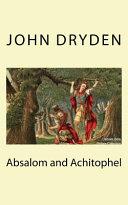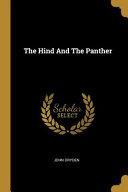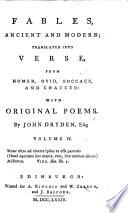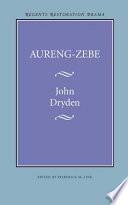Works

Absalom and Achitophel
John Dryden
The Hind and the Panther
John Dryden
Fables, Ancient and Modern
John Dryden
All for Love
John DrydenThe Conquest of Granada
John DrydenReligio Laici
John DrydenAmphitryon
John Dryden
Aureng-zebe
John DrydenTyrannick Love
John DrydenThe Maiden Queen
John DrydenAnnus Mirabilis
John DrydenThe Wild Gallant
John DrydenThe Tempest
John DrydenFamous John Dryden Quotes
Prologue
Source: All for Love (1678)
Context: Let those find fault whose wit's so very small,
They've need to show that they can think at all;
Errors, like straws, upon the surface flow;
He who would search for pearls, must dive below.
Fops may have leave to level all they can;
As pigmies would be glad to lop a man.
Half-wits are fleas; so little and so light,
We scarce could know they live, but that they bite.
“He's somewhat lewd; but a well-meaning mind;
Weeps much; fights little; but is wond'rous kind.”
Prologue
All for Love (1678)
John Dryden Quotes about love
“Pains of love be sweeter far
Than all other pleasures are.”
Variant: Pains of love be sweeter far
Than all other pleasures are.
“Joy rul'd the day, and Love the night.”
Source: Fables, Ancient and Modern (1700), The Secular Masque (1700), Line 82.
“T' abhor the makers, and their laws approve,
Is to hate traitors and the treason love.”
Pt. III, lines 706–707.
The Hind and the Panther (1687)
“Old as I am, for ladies' love unfit,
The power of beauty I remember yet.”
Source: Fables, Ancient and Modern (1700), Cymon and Iphigenia, Lines 1–2.
“For truth has such a face and such a mien
As to be loved needs only to be seen.”
Pt. I, lines 33–34.
The Hind and the Panther (1687)
John Dryden Quotes about God
Pt. II, lines 462–469.
Absalom and Achitophel (1681)
“His tribe were God Almighty's gentlemen.”
Pt. I, line 645. Compare: Julius Hare, Guesses at Truth: "A Christian is God Almighty’s gentleman"; Edward Young, Night Thoughts, Night iv, line 788, "A Christian is the highest style of man".
The Hind and the Panther (1687)
“For those whom God to ruin has design'd,
He fits for fate, and first destroys their mind.”
Pt. III, line 2387.
The Hind and the Panther (1687)
Pt. I, lines 554–557.
Absalom and Achitophel (1681)
Aeneis, Book VI, lines 374–377.
The Works of Virgil (1697)
“So over violent, or over civil,
That every man with him was God or Devil.”
Absalom and Achitophel. Part i. Line 557.
The Hind and the Panther (1687)
John Dryden: Trending quotes
Source: Fables, Ancient and Modern (1700), Cymon and Iphigenia, Line 400.
Pt. I, lines 545–550.
Absalom and Achitophel (1681)
Variant: A man so various, that he seemed to be
Not one, but all mankind's epitome;
Stiff in opinions, always in the wrong,
Was everything by starts, and nothing long;
But, in the course of one revolving moon,
Was chemist, fiddler, statesman, and buffoon.
“In friendship false, implacable in hate,
Resolved to ruin or to rule the state.”
Pt. I, lines 173–174.
Absalom and Achitophel (1681)
John Dryden Quotes
“Death in itself is nothing; but we fear
To be we know not what, we know not where.”
Aureng-Zebe (1676), Act IV, scene i.
A Discourse concerning the Original and Progress of Satire (1693).
Context: How easie is it to call Rogue and Villain, and that wittily! But how hard to make a Man appear a Fool, a Blockhead, or a Knave, without using any of those opprobrious terms! To spare the grossness of the Names, and to do the thing yet more severely, is to draw a full Face, and to make the Nose and Cheeks stand out, and yet not to employ any depth of Shadowing. This is the Mystery of that Noble Trade, which yet no Master can teach to his Apprentice: He may give the Rules, but the Scholar is never the nearer in his practice. Neither is it true, that this fineness of Raillery is offensive. A witty Man is tickl'd while he is hurt in this manner, and a Fool feels it not. The occasion of an Offence may possibly be given, but he cannot take it. If it be granted that in effect this way does more Mischief; that a Man is secretly wounded, and though he be not sensible himself, yet the malicious World will find it for him: yet there is still a vast difference betwixt the slovenly Butchering of a Man, and the fineness of a stroke that separates the Head from the Body, and leaves it standing in its place.
“Content with poverty, my soul I arm;
And virtue, though in rags, will keep me warm.”
On Fortune; Book III, Ode 29, lines 81–87.
Imitation of Horace (1685)
Context: I can enjoy her while she's kind;
But when she dances in the wind,
And shakes the wings and will not stay,
I puff the prostitute away:
The little or the much she gave is quietly resign'd:
Content with poverty, my soul I arm;
And virtue, though in rags, will keep me warm.
St. 1.
A Song for St. Cecilia's Day http://www.englishverse.com/poems/a_song_for_st_cecilias_day_1687 (1687)
Context: From harmony, from heavenly harmony,
This universal frame began:
When nature underneath a heap
Of jarring atoms lay,
And could not heave her head,
The tuneful voice was heard from high,
'Arise, ye more than dead!'
Then cold, and hot, and moist, and dry,
In order to their stations leap,
And Music's power obey.
From harmony, from heavenly harmony,
This universal frame began:
From harmony to harmony
Through all the compass of the notes it ran,
The diapason closing full in Man.
“The wise, for cure, on exercise depend;
God never made his work for man to mend.”
Epistle to John Driden of Chesterton (1700), lines 92–95.
Context: Better to hunt in fields, for health unbought,
Than fee the doctor for a nauseous draught.
The wise, for cure, on exercise depend;
God never made his work for man to mend.
“I am as free as Nature first made man,
Ere the base laws of servitude began”
Part 1, Act I, scene i.
The Conquest of Granada (1669-1670)
Context: I am as free as Nature first made man,
Ere the base laws of servitude began,
When wild in woods the noble savage ran.
Source: Alexander’s Feast http://www.bartleby.com/40/265.html (1697), l. 97–106.
Context: Softly sweet, in Lydian measures,
Soon he soothed his soul to pleasures.
War, he sung, is toil and trouble;
Honor but an empty bubble;
Never ending, still beginning,
Fighting still, and still destroying.
If all the world be worth thy winning.
Think, oh think it worth enjoying:
Lovely Thaïs sits beside thee,
Take the good the gods provide thee.
“Preventing angels met it half the way,
And sent us back to praise, who came to pray.”
Britannia Rediviva (1688), line 1.
Context: Our vows are heard betimes! and Heaven takes care
To grant, before we can conclude the prayer:
Preventing angels met it half the way,
And sent us back to praise, who came to pray.
“Not heaven itself upon the past has power;
But what has been, has been, and I have had my hour.”
Book III, Ode 29, lines 69–72.
Imitation of Horace (1685)
Context: Be fair, or foul, or rain, or shine,
The joys I have possessed, in spite of fate, are mine.
Not heaven itself upon the past has power;
But what has been, has been, and I have had my hour.
Source: Alexander’s Feast http://www.bartleby.com/40/265.html (1697), l. 12–15.
Religio Laici (1682).
Context: More Safe, and much more modest 'tis, to say
God wou'd not leave Mankind without a way:
And that the Scriptures, though not every where
Free from Corruption, or intire, or clear,
Are uncorrupt, sufficient, clear, intire,
In all things which our needfull Faith require.
If others in the same Glass better see
'Tis for Themselves they look, but not for me:
For my Salvation must its Doom receive
Not from what others, but what I believe.
Prologue
All for Love (1678)
Context: What flocks of critics hover here to-day,
As vultures wait on armies for their prey,
All gaping for the carcase of a play!
With croaking notes they bode some dire event,
And follow dying poets by the scent.
Pt. I, line 999–1005. Compare Publius Syrus, Maxim 289, "Furor fit læsa sæpius patientia" ("An over-taxed patience gives way to fierce anger").
Absalom and Achitophel (1681)
Context: Oh that my Pow'r to Saving were confin’d:
Why am I forc’d, like Heav’n, against my mind,
To make Examples of another Kind?
Must I at length the Sword of Justice draw?
Oh curst Effects of necessary Law!
How ill my Fear they by my Mercy scan,
Beware the Fury of a Patient Man.
“It is almost impossible to translate verbally and well at the same time”
Works of John Dryden (1803) as quoted by P. Fleury Mottelay in William Gilbert of Colchester (1893)
Context: It is almost impossible to translate verbally and well at the same time; for the Latin (a most severe and compendious language) often expresses that in one word which either the barbarity or the narrowness of modern tongues cannot supply in more.... But since every language is so full of its own proprieties that what is beautiful in one is often barbarous, nay, sometimes nonsense, in another, it would be unreasonable to limit a translator to the narrow compass of his author's words; it is enough if he choose out some expression which does not vitiate the sense.
Essay of Dramatick Poesie (1668)
Context: To begin then with Shakespeare; he was the man who of all Modern, and perhaps Ancient Poets, had the largest and most comprehensive soul. All the Images of Nature were still present to him, and he drew them not laboriously, but luckily: when he describes any thing, you more than see it, you feel it too. Those who accuse him to have wanted learning, give him the greater commendation: he was naturally learn'd; he needed not the spectacles of Books to read Nature; he look'd inwards, and found her there. I cannot say he is every where alike; were he so, I should do him injury to compare him with the greatest of Mankind. He is many times flat, insipid; his Comick wit degenerating into clenches; his serious swelling into Bombast. But he is alwayes great, when some great occasion is presented to him: no man can say he ever had a fit subject for his wit, and did not then raise himself as high above the rest of the Poets
Essay of Dramatick Poesie (1668)
Context: To begin then with Shakespeare; he was the man who of all Modern, and perhaps Ancient Poets, had the largest and most comprehensive soul. All the Images of Nature were still present to him, and he drew them not laboriously, but luckily: when he describes any thing, you more than see it, you feel it too. Those who accuse him to have wanted learning, give him the greater commendation: he was naturally learn'd; he needed not the spectacles of Books to read Nature; he look'd inwards, and found her there. I cannot say he is every where alike; were he so, I should do him injury to compare him with the greatest of Mankind. He is many times flat, insipid; his Comick wit degenerating into clenches; his serious swelling into Bombast. But he is alwayes great, when some great occasion is presented to him: no man can say he ever had a fit subject for his wit, and did not then raise himself as high above the rest of the Poets
“Bold knaves thrive without one grain of sense,
But good men starve for want of impudence.”
Constantine the Great (1684), Epilogue.
Source: The Poetical Works of John Dryden
“Beware the fury of a patient man.”
Pt. I, line 999–1005. Compare Publius Syrus, Maxim 289, "Furor fit læsa sæpius patientia" ("An over-taxed patience gives way to fierce anger").
Absalom and Achitophel (1681)
Variant: Beware the Fury of a Patient Man.
Context: Oh that my Pow'r to Saving were confin’d:
Why am I forc’d, like Heav’n, against my mind,
To make Examples of another Kind?
Must I at length the Sword of Justice draw?
Oh curst Effects of necessary Law!
How ill my Fear they by my Mercy scan,
Beware the Fury of a Patient Man.
“Great wits are sure to madness near alli'd;
And thin partitions do their bounds divide”
Pt. I, lines 159–172.
Source: Absalom and Achitophel (1681)
Context: A daring pilot in extremity;
Pleas'd with the danger, when the waves went high
He sought the storms; but for a calm unfit,
Would steer too nigh the sands, to boast his wit.
Great wits are sure to madness near alli'd;
And thin partitions do their bounds divide:
Else, why should he, with wealth and honour blest,
Refuse his age the needful hours of rest?
Punish a body which he could not please;
Bankrupt of life, yet prodigal of ease?
And all to leave, what with his toil he won
To that unfeather'd, two-legg'd thing, a son:
Got, while his soul did huddled notions try;
And born a shapeless lump, like anarchy.
“There is a pleasure sure
In being mad which none but madmen know.”
Act II, scene 1.
The Spanish Friar (1681)
Book III, Ode 29, lines 65–68.
Imitation of Horace (1685)
Grand Chorus.
A Song for St. Cecilia's Day http://www.englishverse.com/poems/a_song_for_st_cecilias_day_1687 (1687)
Source: The Major Works
Context: So, when the last and dreadful Hour
This crumbling Pageant shall devour,
The trumpet shall be heard on high,
The dead shall live, the living die,
And musick shall untune the Sky.
“Secret guilt by silence is betrayed.”
Pt. III, line 763.
The Hind and the Panther (1687)
“But far more numerous was the herd of such,
Who think too little, and who talk too much.”
Pt. I, lines 532–533. Compare Matthew Prior, Upon a Passage in the Scaligerana, "They always talk who never think".
Source: Absalom and Achitophel (1681)
“What passion cannot Music raise and quell?”
St. 2.
A Song for St. Cecilia's Day http://www.englishverse.com/poems/a_song_for_st_cecilias_day_1687 (1687)
Variant: What passion cannot Music raise and quell?
“The trumpet's loud clangor
Excites us to arms.”
St. 3.
A Song for St. Cecilia's Day http://www.englishverse.com/poems/a_song_for_st_cecilias_day_1687 (1687)
“She hugged the offender, and forgave the offense:
Sex to the last.”
Source: Fables, Ancient and Modern (1700), Cymon and Iphigenia, Lines 367–368.
“Jealousy, the jaundice of the soul.”
Pt. III, line 73.
The Hind and the Panther (1687)
“Your ignorance is the mother of your devotion to me.”
The Maiden Queen, Act i, scene 2.
Bartlett's Familiar Quotations, 10th ed. (1919)
“Thespis, the first professor of our art,
At country wakes sung ballads from a cart.”
Prologue to Lee's Sophonisba.
Bartlett's Familiar Quotations, 10th ed. (1919)
“A brave man scorns to quarrel once a day;
Like Hectors in at every petty fray.”
Prologue
All for Love (1678)
“And, like another Helen, fir'd another Troy.”
Source: Alexander’s Feast http://www.bartleby.com/40/265.html (1697), l. 154.
Source: Fables, Ancient and Modern (1700), The Secular Masque (1700), Lines 86–91.
Preface to Translations from Theocritus, Lucretius, and Horace, in Sylvæ: or, The second part of Poetical Miscellanies, published by Mr. Dryden, third edition (London, 1702).
“Like you, an alien in a land unknown,
I learn to pity woes so like my own.”
Aeneis, Book I, lines 889–890.
The Works of Virgil (1697)
“Above any Greek or Roman name.”
Upon the Death of Lord Hastings, line 76. Compare: "Above all Greek, above all Roman fame"; Alexander Pope, Epistle I, Book 2, line 26.
Bartlett's Familiar Quotations, 10th ed. (1919)
"Plutarch's Lives," Vol 1, Barnes & Noble Inc., 2006, Lysander p. 646
Translation from Greek originalː "τὸ ἀληθὲς οὐ φύσει τοῦ ψεύδους κρεῖττον ἡγούμενος, ἀλλ' ἑκατέρου τῇ χρείᾳ τὴν τιμὴν ὁρίζων."
Religio Laici (1682).
“Can heav'nly minds such high resentment show,
Or exercise their spite in human woe?”
Aeneis, Book I, lines 17–18.
The Works of Virgil (1697)
Source: Mac Flecknoe (1682), l. 19–24.
Act IV, scene i.
Œdipus (1679)
“Nor can his blessed soul look down from heaven,
Or break the eternal sabbath of his rest.”
Act V, scene 2.
The Spanish Friar (1681)
“By viewing Nature, Nature's handmaid Art,
Makes mighty things from small beginnings grow.”
Annus Mirabilis (1667), stanza 155.
The First Book of Homer's Ilias
Fables, Ancient and Modern (1700)
“Of ancient race by birth, but nobler yet
In his own worth.”
Pt. I, lines 900–901.
Absalom and Achitophel (1681)
